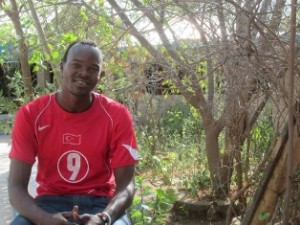Warm-up Question
What is the last fruit or vegetable you ate, and when did you eat it?
Fruit-Full
America is the breadbasket of the world. Walk into any grocery store, and you will find thousands of items to choose from. The average American spends thousands of dollars each year on all kinds of food, from groceries to fast food to sit down restaurant meals served by waitstaff.
Despite the abundance and variety of food available in this country, it seems that many Americans are failing to get enough of certain foods considered to be important to good health. The government recommends that kids and adults get at least 2 ½ cups of vegetables and 2 cups of fruit per day.

Most say that they are trying to eat more fruits and vegetables, but the average person eats only about a cup of vegetables and half a cup of fruit each day. Teens and the elderly are the groups eating the least of these healthy foods.
Fruits and vegetables are important for a healthy diet because they contain vitamins, minerals, fiber and antioxidants. Many of these healthy nutrients are not found in other types of foods such as breads, meats, or fats. A balanced diet can prevent disease and prolong life.
According to Elizabeth Pivonka of the Produce for Better Health Foundation, even adding small amounts of fruits and vegetables to normal meals can help your overall health. Putting raisins in cereal, veggies on sandwiches, and drinking 100% fruit juices can help people get to the recommended number of servings per day.
Another way to make sure there are enough fruits and vegetables in someone’s diet is to aim to fill half the plate with those foods. More frequent grocery shopping may be needed to make sure the house stays stocked with fresh produce. Instead of shopping every two weeks, people may need to shop once or twice a week.
Discussion Questions
- Why do you think many people don’t eat enough fruits and vegetables? Consider the following: people relying on food stamps, the menus of the fast food restaurants you frequent, and the fact that many low-income neighborhoods don’t have grocery stores in them.
- How does government policy affect what foods are affordable and available?
- What steps could restaurants and grocery stores take to improve this situation? Do you believe they should be forced to do so?
- Do you think food advertising generally helps or hinders people from eating more fruits and vegetables?
- What positive forces exist to help people eat the right amount of fruits and vegetables?
Fifth Sunday of Easter
(Text links are to Oremus Bible Browser. Oremus Bible Browser is not affiliated with or supported by the Evangelical Lutheran Church in America. You can find the calendar of readings for Year B at Lectionary Readings
For lectionary humor and insight, check the weekly comic Agnus Day.
Gospel Reflection
We’re going to move on from talking about eating fruit to considering what it means to “bear fruit.” Bearing fruit is more than simply doing good things or being good. Bearing fruit can only happen if we are connected to Jesus—if our actions grow out of that connection.
Good things can be done by anyone. Apart from God, our good works are more like candy than fruit. They seem good—but they are artificially made, and they are not connected to anything. Furthermore, they aren’t really healthy for anyone. They may give a good result initially, but they don’t ultimately lead to anything good.
What a beautiful analogy Jesus gives here about how living as his follower works. Knowing Jesus makes us want to do good things, but only being connected to him and his power can allow us to do the right kinds of good things in the right ways and for the right reasons—bearing fruit that lives on and produces more fruit through its seeds. Fruit that doesn’t come from a branch connected to the true vine (Jesus) will eventually wither or rot or become unhealthy.
In order to bear fruit, the branch has to be healthy. God’s influence over our lives can allow us to become healthy enough to bear fruit. As we live in relationship to God through Christ, bearing fruit has a lot to do with the ways God changes us to become more like him.
Discussion Questions
- What are some things we can do to nurture the connection to Jesus so that we are indeed fruitful?
- Many people do good things–including persons of other faith traditions or no religious tradition at all. What is gained by being connected to Jesus? Why does it matter?
Activity Suggestions
- Start a community garden on your church property or other land, and donate the produce to a local food bank. Fresh produce is rare at food banks, making it difficult for those in need to eat a healthy diet. This is a big undertaking, but it can make a big difference in the community—a way to bear fruit literally and figuratively.
- Organize a collection of fruits and vegetables to benefit a food bank or otherwise give away to those in need. Because fresh fruits and vegetables don’t last long, it’s best to have a defined collection day and then deliver to the food bank right away.
Closing Prayer
Dear God, we thank you for the blessings of food to eat. Help us remember to stay connected to Jesus the true vine, so that we can bear good fruit to benefit the world around us as we become more like him. We pray these things in Jesus’ name, amen.





